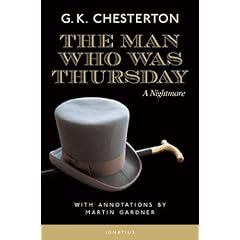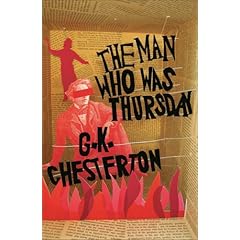 Weird. Nightmare-ish. Imaginative. Chestertonian. Spoilers follow.
Weird. Nightmare-ish. Imaginative. Chestertonian. Spoilers follow.
The Man Who Was Thursday fits all of these adjectives, and to be honest I’m not sure I understand what Chesterton was doing in this novel about a subversive policeman poet who infiltrates and stands against the forces of anarchy. Only it turns out that there are no real anarchists? Or maybe only one or two? Is Chesterton saying that evil is, in the end, only an illusion? That God provides men with the illusion of evil in order to test them and give them the opportunity to suffer and show courage? Or is it that in order to confront real evil, men must “tested by fire” and know suffering? Maybe I’m not intelligent enough for Chesterton.
However that may be, the plot moves quickly and furiously through madcap chases and revelations and surprises. The characters are rather difficult to keep straight, especially since their essential personalities keep changing or being revealed to be other than what the reader first thought them to be. The story is full of such twists and turns and unexpected developments, and by this literary technique Chesterton draws his readers into a dream world in which reality changes colors and aspects in a rapid-fire sequence of fantastical events.
The penultimate scene in the novel is a Job-like Council in which a Real Anarchist confronts the forces of Law and Order and Righteousness. And the Real Anarchist is answered, as Job was answered, with a question: “Can ye drink of the cup I drink of?” The themes of the novel are revealed to be those of redemption through suffering and of the seemingly contradictory faces of God, his justice and his mercy.
It’s a strange nightmare of a vision, and yet Kafka said of Chesterton’s writing, “He is so gay, one might almost believe he had found God.” C.S. Lewis apparently (according to my book’s introduction by Jonathan Lethem) compared Chesterton to Kafka, but Lethem says that Chesterton is instead the anti-Kafka, “so thrilled by his acrobatic stroll along the razor’s edge of nihilism the he earns his sunniness anew on every page.” The book does end with more questions than answers, but also with the main character having “an unnatural buoyancy in his body and a crystal simplicity in his mind that seemed to be superior to everything that he said or did. He felt he was in possession of some impossible good news, which made every other thing a triviality, but an adorable triviality.” Chesterton’s vision of the epic battle of Good versus Evil ends with a sunrise.
NOTE: I thought the strange and bewildering variety of covers at Amazon was somewhat illustrative of the many ways in which Chesterton’s nightmare turned into good news has been understood (or misunderstood) by various people. In a brief commentary appended to my edition, Chesterton even writes that a group of Bolshevists in Eastern Europe, without the author’s permission, “tried to turn this anti-Anarchist romance into an Anarchist play. Heaven only knows what they really made of it; beyond apparently making it mean the opposite of everything it meant.” If so, Chesterton has only himself to thank for writing a story with so many 180 degree turns and unmaskings that when a reader is finished he’s so confused that he’s not sure what’s opposite and what’s inside.












